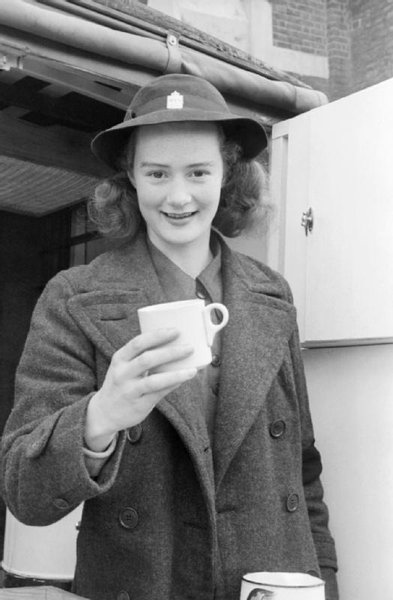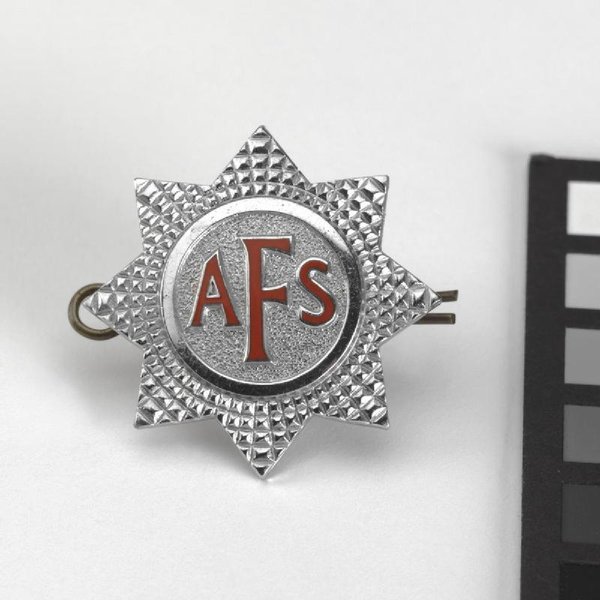Bombs dropped in the ward of: Clerkenwell
Description
Total number of bombs dropped from 7th October 1940 to 6th June 1941 in Clerkenwell:
- High Explosive Bomb
- 70
- Parachute Mine
- 3
Number of bombs dropped during the week of 7th October 1940 to 14th of October:
Number of bombs dropped during the first 24h of the Blitz:
No bombs were registered in this area
Memories in Clerkenwell
Read people's stories relating to this area:
Contributed originally by Michael McEnhill (BBC WW2 People's War)
Germ Warfare.
"And some are sung and that was yesterday
And some unsung,and that may tomorrow be".
Francis Thompson (1859-1907)
"Stop there!" A harsh voice came out of the darkening night.Susan McGinley brought her bicycle to an abrupt stop at the very top of the steep Black Lion Hill, Shenley.
Preventing her from going any further and shining his torch directly into her dazzled eyes, the village policeman surveyed his "catch!" Close up, he took in the firm set face with blue rebellious eyes. Perched on her head was a navy blue cap which matched her coat,of such length it draped her knees, outlining the sheen of fine, strong legs.
He pressed her with questions. "What was she about at this time of night with a war on? Where to? Where from?"
After giving her name, she told him that she lodged at the base of the hill with her married sister, but that she was originally from Altaneerin, in Donegal, if he would know where that was. She was going to her place of work until he had stopped her. She had still three more miles to travel to Clare Hall Hospital in South Mimms. She was a qualified State-Enrolled nurse in an urgent hurry to get to her work in time, war or no war, and attend to desparately ill patients.
The policeman showed no inclination to be rid of her or to listen to her entreaties as to the plight of her patients or her own personal position. Rather, on this cold night in the latter part of January 1941, the policeman officiously pounced on the fact that her rear light was not functioning, to which Susan McGinley weakly exclaimed that she had tried reviving her battery on the kitchen range, but it must be "whacked" and that she would have to purchase a new one.That was not good enough for the policeman who summoned her to appear before the Magistrates Court at Barnet.She would have to push her bicycle the remainder of the way to the hospital where she worked.
She struggled along the lane,fearful, solitary and weary.At times a rake of searchlights sent up pillars of light into the black sky to laser back and forth.At ground level anti-aircraft emplacements were ready to puncture the night air, the banter of the crews reaching her across the leafless hedges.
The Matron,Mrs Spaley, gave her a severe talking to when she arrived late. However,it was not until a few weeks later when Susan McGinley was fined ten shillings by the Court and her case had made the columns of the Daily Express that the indignant Matron gave full vent to her feelings."I admire your fine words which have found their ways into the paper, - 'as a nurse it was my duty to relieve the sick and suffering'. However,I take grave exception to the fact that you made the location of this hospital thoroughly well known to Mr Hitler and his cronies, and I, myself, and all my staff, will be forever up and down to the air-raid shelter from this time on.I've a good mind to sack you!"
She discussed this proposal with the Medical Superintendant, Dr Simmonds, who opined that it was for her only to decide. Fortunately Dr.Laird the surgeon of the hospital came to her support declaring that she was an excellent nurse and should continue to be employed by the hospital.
Thereafter, she lost herself in her work, putting her patients before herself.'Self' in those days was a luxury one could not afford, one's patients were always at the forefront of one's thoughts. The hospital at Clare Hall had moved from Clerkenwell and was originally devoted to the treatment of small-pox diseases and has a history of over two hundred years, being situated here in 1896. The incidence of small-pox was high in 1901, and the surrounding village suffered for which the hospital was blamed for the contagiousness of disease.
At that time nurses were recruited from the old Nurses' Co-operative Society at three guineas a week, a sum regarded as a high reward, for only the best nurses were to have charge of such a serious disease.
It was in May 1911, that Clare Hall Hospital treated patients with tuberculosis. It was used for treating advanced tuberculosis patients so there was an air of gloom and despondency about the place in 1935: 39% of the patients were discharged by death; with better investigation and treatment results were more cheerful and patients were happier. Although the known causation of the disease at this time had been isolated as Koch's Bacillus, it was still maintained by medical practitioners that one could not cure a fool of tuberculosis owing to the treatment being long and troublesome.
With the diminution of small-pox cases medical forces were directed against this more prevalent scourge and it took all the resources of the medical and nursing staff, both mental and physical, to forestall its ravages of the population.
USA Army Surgeon-General Bushnell's famous remark lies at the base of all treatment: "For tuberculosis we prescribe not medicine but a mode of life".
This is where Clare Hall Hospital and its nursing staff came into their own. As the disease was highly infectious the patients had to be isolated. Endless steadfastness, courage, self-discipline and self-denial were required of them. They were housed in a hutted sanatorium which was part of the Emergency Medical Service. The 'huts' were of brick construction with asbestos sheeted roofs.At the onset of the war it was adapted as a general hospital to meet the needs of the civilian casualties, acting as a base hospital receiving local and transferred air-raid casualties from London.
However, very soon the need for a special effort to combat tubercullosis under war conditions meant that all the beds were occupied with tubercullosis patients by December 1942, a total of 540 beds.
Surgical methods of radical character only began just before the war.
Susan McGinley worked throughout the war.There were several hundred nursing staff employed at the hospital during this time.Nurse McGinley tells me that at least half the nursing staff were from Ireland, 'from the four corners, as they say'; she herself enthuses that they indeed were a credit to their country.While others were fighting a mighty battle in Europe and in the desert sands of Africa and even further afield, she and her colleagues were fighting the furious tuberculosis disease, with no let up,in the sanatorium in South Mimms.
The nursing regime was arduous for the disease requires very skilled treatment, the esentials of which are: rest, both of mind and body, fresh air and sunlight, routine and discipline, and correct feeding. By its very nature of confinement, owing to the disease being highly infectious, the disease was doubly trying and the barrier nursing required scrupulous attention to the rules of hygiene. Patients were confined to to bed at night for ten to twelve hours, necessitating more blanket baths, more bed linen changes, and all this with very difficult and demanding patients.
Along with the tremendous bouts of coughing, pain and all round debilitating ill-health, the patients exhibited what was known as a TB temperament when they would be very irritable and show extremes of temper to the nurses or for that matter anyone else who happened unfortuantely to cross their firing line.
Nurses would suffer and be expected to take many a 'tongue-lashing!'At such times the patients could also 'act-up' when smuggled cigarretes would be secretly smoked under the sheets in their beds. They would also abscond by donning a flying jacket or army greatcoat or such like over their pyjamas and make haste for the 'Old Guinea Pub' a few hundred yards from the main gate with, invariably some nurses in hot pursuit. They would be read the riot act and threatened with immediate expulsion from the hospital.No doubt within a few days they would be welcomed back into the folds of tender and loving care again.
Dr. Simmonds, in a Medical History of Clare Hall Hospital says: 'With the decline in the incidence and mortality of tuberculosis the hospital should be used for pulmonary, cardiac and other chest conditions. Tuberculosis had been largely beaten at that time and the nursing staff deserve to be honoured for relieving the suffering of many thousands of patients and making known to people not only the essential cure of the disease but also the socio-economic origins in poor housing, environment, diet and life styles".
Now, there is nothing left to tell the tale, just the sycamore tree with fresh new branches, where the nurses used to sit many years ago.
There is a worthy adendum or supplementary history to this story surrounding Susan McGinley's exploits during World War 11.
The people of America alerted by 'The Philadelphia Inquirer' as to her predicament in being dragged before the courts at Barnet were outraged that this should happen to a valuable night-nurse during the blitzkrieg, of London.
About to enter the war themselves it was a subject of contention throughout America as to the conduct of the War. They went so far as to invite Susan to their country and promised to provide her with a new bicycle.She would be paraded in the great cities as the 'Florence Nightingale Flyer' who defied Hitler during the height of the Blitz determined to see to the wounded and dying serviceman injured during the war. A medal would be cast in her honour.
Years later we were invited to contribute to Guy Michelmore and Louise Bachelor's programme retrospective film 'Memories of War' but I am sad to say nothing came of it. There was talk of the film being too expensive.











